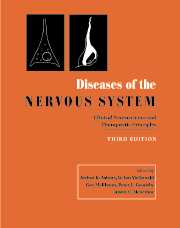Book contents
- Frontmatter
- Dedication
- Contents
- List of contributors
- Editor's preface
- PART I INTRODUCTION AND GENERAL PRINCIPLES
- PART II DISORDERS OF HIGHER FUNCTION
- 13 Congenital disorders of cerebral cortical development
- 14 The aging brain: morphology, imaging and function
- 15 Neurodegenerative diseases
- 16 Aging and dementia: principles, evaluation and diagnosis
- 17 Alzheimer's Disease
- 18 Dementia with Lewy bodies
- 19 Frontotemporal dementia
- 20 Consciousness and its disorders
- 21 Mechanisms of memory and amnestic syndromes
- 22 Acquired disorders of language
- 23 Neglect
- 24 Brain death
- 25 Disorders of mood
- 26 Schizophrenia
- 27 Obsessive–compulsive disorder
- 28 Autism and autistic spectrum disorders
- 29 Attention deficit hyperactivity disorder: spectrum and mechanisms
- 30 The neurobiology of drug addition
- PART III DISORDERS OF MOTOR CONTROL
- PART IV DISORDERS OF THE SPECIAL SENSES
- PART V DISORDERS OF SPINE AND SPINAL CORD
- PART VI DISORDERS OF BODY FUNCTION
- PART VII HEADACHE AND PAIN
- PART VIII NEUROMUSCULAR DISORDERS
- PART IX EPILEPSY
- PART X CEREBROVASCULAR DISORDERS
- PART XI NEOPLASTIC DISORDERS
- PART XII AUTOIMMUNE DISORDERS
- PART XIII DISORDERS OF MYELIN
- PART XIV INFECTIONS
- PART XV TRAUMA AND TOXIC DISORDERS
- PART XVI DEGENERATIVE DISORDERS
- PART XVII NEUROLOGICAL MANIFESTATIONS OF SYSTEMIC CONDITIONS
- Complete two-volume index
- Plate Section
22 - Acquired disorders of language
from PART II - DISORDERS OF HIGHER FUNCTION
Published online by Cambridge University Press: 05 August 2016
- Frontmatter
- Dedication
- Contents
- List of contributors
- Editor's preface
- PART I INTRODUCTION AND GENERAL PRINCIPLES
- PART II DISORDERS OF HIGHER FUNCTION
- 13 Congenital disorders of cerebral cortical development
- 14 The aging brain: morphology, imaging and function
- 15 Neurodegenerative diseases
- 16 Aging and dementia: principles, evaluation and diagnosis
- 17 Alzheimer's Disease
- 18 Dementia with Lewy bodies
- 19 Frontotemporal dementia
- 20 Consciousness and its disorders
- 21 Mechanisms of memory and amnestic syndromes
- 22 Acquired disorders of language
- 23 Neglect
- 24 Brain death
- 25 Disorders of mood
- 26 Schizophrenia
- 27 Obsessive–compulsive disorder
- 28 Autism and autistic spectrum disorders
- 29 Attention deficit hyperactivity disorder: spectrum and mechanisms
- 30 The neurobiology of drug addition
- PART III DISORDERS OF MOTOR CONTROL
- PART IV DISORDERS OF THE SPECIAL SENSES
- PART V DISORDERS OF SPINE AND SPINAL CORD
- PART VI DISORDERS OF BODY FUNCTION
- PART VII HEADACHE AND PAIN
- PART VIII NEUROMUSCULAR DISORDERS
- PART IX EPILEPSY
- PART X CEREBROVASCULAR DISORDERS
- PART XI NEOPLASTIC DISORDERS
- PART XII AUTOIMMUNE DISORDERS
- PART XIII DISORDERS OF MYELIN
- PART XIV INFECTIONS
- PART XV TRAUMA AND TOXIC DISORDERS
- PART XVI DEGENERATIVE DISORDERS
- PART XVII NEUROLOGICAL MANIFESTATIONS OF SYSTEMIC CONDITIONS
- Complete two-volume index
- Plate Section
Summary
In 1915, the British neurologist Henry Head commented on recent developments in clinical aphasiology and concluded that: ‘It is generally conceded that the views on aphasia and analogous disturbances of speech found in the textbooks of today are of little help in understanding an actual case of disease’ (Head, 1915). This may still be true to a certain extent, although perhaps for different reasons from those that Head had in mind. Most textbooks typically describe classical aphasia syndromes that are based on chronic, stable patients; thus by definition different from the patient with acute symptoms that the neurologist typically encounters. It has been estimated that only 20–30% of all patients with aphasia will fit neatly into one of the classical aphasia syndromes (Albert et al., 1991). Nonetheless, the clinical use of the classical syndrome classification as a basis for diagnosis has continued more or less unchanged.
The convenience of this approach in clinical settings notwithstanding, increasing dissatisfaction with the classical taxonomy of aphasia has been expressed by researchers in the field of aphasia, in particular psycholinguistics and cognitive psychologists (Schwartz, 1984). The principal concern is that the classical model does not necessarily generate any meaningful generalizations about the nature of brain-language relationships. Some have argued that the classical aphasia syndromes do not meet standard criteria for a syndrome, in that none of the syndromes can be characterized in terms of invariant features that are shared by all patients given a certain classification and are absent in patients with a different classification (Caramazza, 1984). Classical taxonomy can thus best be characterized as polytypic, implying that any given feature or impairment, for example phonological paraphasias, can be part of more than one syndrome (Schwartz, 1984).
Despite the controversy over classical aphasia taxonomy in research settings and the limited number of aphasic patients it accounts for, the clinical utility of classic aphasia syndromes has rarely been questioned. It appears to have been assumed that the syndromes are associated with a certain degree of anatomical predictability, which may allow the clinician to infer lesion location, etiology, and prognosis (Albert et al., 1991). Recent studies have questioned the validity of these assumptions, however.
Information
- Type
- Chapter
- Information
- Diseases of the Nervous SystemClinical Neuroscience and Therapeutic Principles, pp. 317 - 330Publisher: Cambridge University PressPrint publication year: 2002
